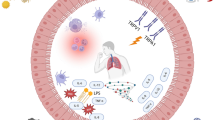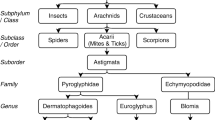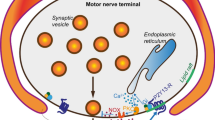Abstract
We studied the effects of C. botulinum C2 toxin, which ADP-ribosylates G-actin, on mast cell degranulation. C2 toxin inhibited degranulation of suspended rat peritoneal mast cells induced by compound 48/80 and dinitrophenyl-conjugated bovine serum albumin (DNP-BSA) maximally by about 50 and 90%, respectively. Inhibition by C2 toxin occurred in a time- and concentration-dependent manner. Half-maximal inhibition of DNP-BSA-induced degranulation by C2 toxin occurred at about 0.015 ng/ml, whereas stimulation of mast cells induced by compound 48/80 was half-maximally inhibited at 0.15 ng/ml C2 toxin. C2 toxin also inhibited stimulated [3H]serotonin release from suspended mast cells. Phorbol 12-myristate 13-acetate (PMA)-induced histamine release of suspended mast cells was inhibited by C2 toxin by about 80–90%. C2 toxin had no effect on calcium ionophore A23187-induced histamine release. Toxin treatment of mast cells caused ADP-ribosylation of actin and depolymerisation of F-actin. Attachment of mast cells, which largely increased the diameter of the subcortical actin network, reduced degranulation stimulated by compound 48/80, antigen and calcium ionophore but not by PMA. Opposite to its effect on suspended cells, in adherent mast cells C2 toxin stimulated degranulation by compound 48/80, antigen, and calcium ionophore but not by PMA. The data indicate that mast cell degranulation and responsiveness towards the actin-depolymerising C2 toxin depend largely on mast cell attachment.
Similar content being viewed by others
Author information
Authors and Affiliations
Additional information
Received: 7 October 1996 / Accepted: 22 November 1996
Rights and permissions
About this article
Cite this article
Wex, C., Koch, G. & Aktories, K. Effects of Clostridium botulinum C2 toxin-induced depolymerisation of actin on degranulation of suspended and attached mast cells. Naunyn-Schmiedeberg's Arch Pharmacol 355, 319–327 (1997). https://doi.org/10.1007/PL00004949
Issue Date:
DOI: https://doi.org/10.1007/PL00004949




